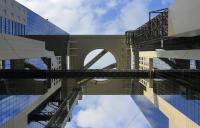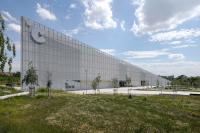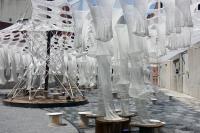Apartment House
Berlin, Germany
Tucked away in the inner courtyard of a block in Berlin’s Prenzlauer Berg neighborhood, an unusual residential house has emerged: With it’s steep roof looming some 10 meters above the building — more pyramid than cube — this boldly shaped building is entirely enveloped by a multi-colored brick skin. Irregularly proportioned aluminum-frame windows reference the history of these inner courtyards, often given over to industrial use in this area of the city at the time of the district’s initial development. At first glance, the appearance of the house does not seem to adhere to popular current conceptions of context-driven building expansions. In fact, it is the end result of tight parameters stemming from building regulations and historic preservation conditions. Used creatively as design tools, these restrictions led to a building that seems at the same time both familiar and strange, capable of blending into its surroundings while maintaining a strong independent character.
Within a framework of redensification, two initially conflicting positions needed mediating: the historic preservation office, involved due to the existing heritage protection of the building block ensemble, stipulated that the new building follow the cubature of the initial structure that had been destroyed during the war, in effect reconstructing the original configuration. But this was rejected by the city’s building department due to current setback regulations. The solution was to create a steeply sloped roof with an eave height of only around 7.50 m. With a slope of just under 70°, the roof stretches over three stories up to the building’s upper edge, standing at a height of approx. 18 m, where a roof terrace seems to clip the pyramid’s peak. The resulting volume, resembling the archetypal shape of a house in a child’s drawing, satisfied the prescribed distance requirements between the building and the three neighboring plots.
The house has two residential units that are organized as multi-level apartments. The lower unit, about 250 sqm, is organized into a ground-level living floor opening onto a private courtyard garden, with bedrooms located on the second floor. The upper apartment, about 200 sqm, consists of four levels: two for living, one for sleeping, and a roof terrace.
- Architects
- Barkow Leibinger
- Location
- Berlin, Germany
- Year
- 2016
- Client
- Private
- Team
- Antje Steckhan, Martina Bauer, Marian Beschoner, Andreas Lang (Projektleitung / Project Architect)
- Procurement and Construction Management
- BAL Bauplanungs und Steuerungs GmbH, Berlin, Germany
- Structural Engineer
- HHT-Bauingenieure Ingenieurgemeinschaft für Tragwerksplanung + Baukonstruktion GbR, Berlin, Germany
- Energy Design
- Müller-BBM GmbH, Berlin, Deutschland
- HVAC, Electrical Engineering
- HDH GmbH, Berlin, Germany
- Façade Engineering
- Dipl.-Ing. (TU) Karl Hügerich GmbH, Berlin, Germany
- Brick Company
- Janhsen Bau GmbH, Herford, Germany
- Brick Manufacturer
- GOLEM Kunst- und Baukeramik GmbH, Jacobsdorf OT Sieversdorf, Germany
- Metal Works
- ASSMANN & KLASEN GmbH & co. KG, Rüdersdorf bei Berlin, Germany








